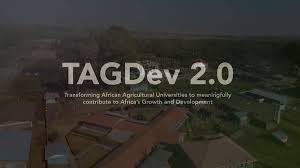The University of Port Harcourt (UniPort) has officially launched the Transforming African Agricultural Universities to Meaningfully Contribute to Africa’s Growth and Development Phase 2.0 (TAGDev 2.0) program, marking a significant stride in Nigeria’s commitment to agricultural advancement and youth empowerment.
In a statement delivered during the launch event, Vice Chancellor Professor Owunari Georgewill emphasized the university’s dedication to the successful implementation of TAGDev 2.0. He highlighted the program’s potential to revolutionize agricultural education across Africa by strengthening universities and Technical Vocational Education and Training (TVET) institutions. The initiative aims to better serve communities by equipping and empowering Africa’s youth, particularly women, to drive inclusive, equitable, and climate-resilient transformations in agriculture and agri-food systems.
TAGDev 2.0 is a collaborative effort coordinated by the Regional Universities Forum for Capacity Building in Agriculture (RUFORUM), headquartered in Kampala, Uganda. The program is implemented in partnership with the Mastercard Foundation, the Global Confederation of Higher Education Associations for Agricultural and Life Sciences (GCHERA), and twelve African universities, including UniPort.
At UniPort, the program focuses on enhancing the rice value chain within Nigeria’s agri-food system. The university, serving as the lead institution, collaborates with three other RUFORUM member universities and two TVET institutes to co-create research for development initiatives. These initiatives encompass bachelor’s, master’s, and doctoral scholarship awards, community action research to support awareness and mediation at the community level, and job creation through enterprise development.
The program targets the training of 60,000 students through scholarships, with an additional 20,000 students receiving training in various skills. Furthermore, 450,000 students are expected to be trained in entrepreneurship and innovation, contributing to job and wealth creation across the continent.
Professor Georgewill commended the collaborative efforts of all stakeholders involved in the TAGDev 2.0 program. He expressed optimism that the initiative would achieve its expected outcomes, transforming agricultural education and empowering the next generation of African leaders in agriculture.
The launch event was attended by representatives from partnering institutions, government agencies, and members of the academic community, all of whom pledged their support for the successful implementation of TAGDev 2.0 at UniPort


